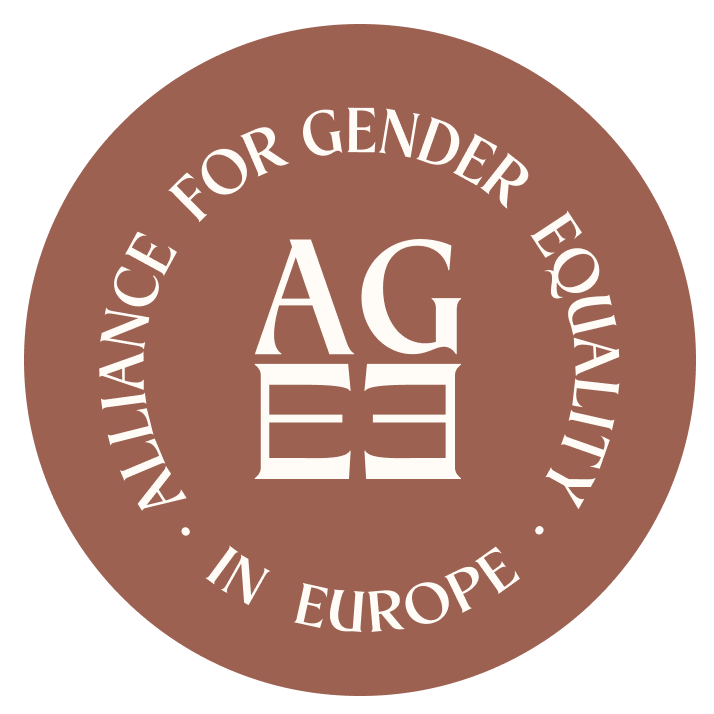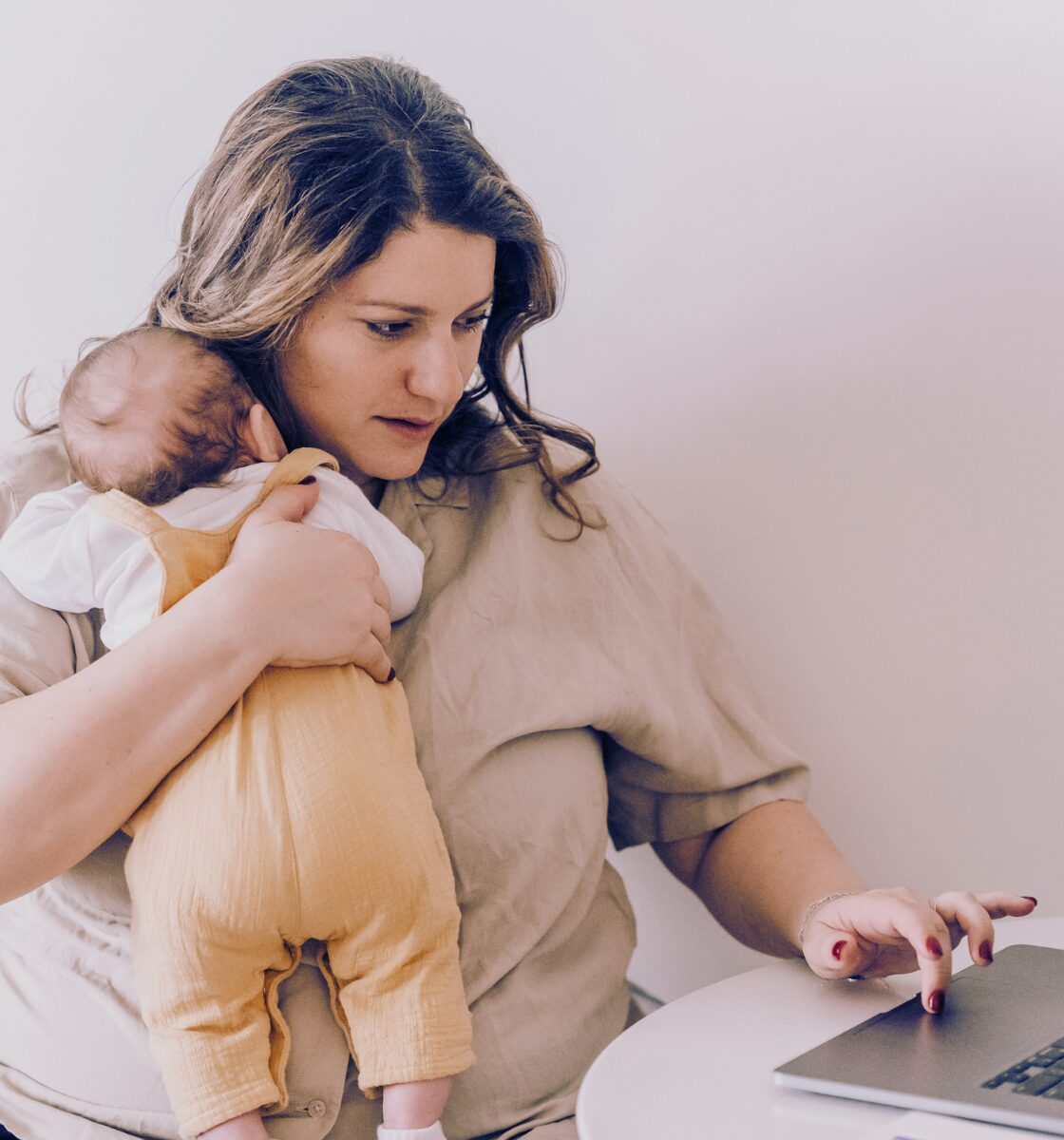Before giving birth to her child, Iris worked as a reporter, covering local news stories and aspiring to lead her own investigative team in the future. But when her baby arrived, she discovered that all nearby nurseries closed at 3 p.m. Suddenly, full-time work was out of reach, and her dreams had to be put on hold.
Iris’s story is far from unique.
Employment gap
Despite progress over the past decades, there are still fewer women in work than men. Across the EU, 70% of women aged 20 to 64 are employed compared to 80% of men. The gap is widest in Romania, Italy and Greece.
The divide deepens when children enter the picture. The employment rate drops for women with children, and almost one-third of women shift to part-time work. For men, the opposite is often true: when they become parents, they often see an employment boost.
“Women in Greece who work full-time are not the majority because they are still overwhelmingly responsible for unpaid care work, while flexible, affordable childcare and supportive workplace policies remain limited. Full-time employment often comes at an unsustainable personal cost,” according to Pinelopi Theodorakakou, co-founder and Head of Programs & Impact from WHEN, an organisation in Greece dedicated to women’s economic empowerment and gender equality in the workplace.
The motherhood penalty
This phenomenon, known as the “motherhood penalty,” is one of the leading drivers of income inequality. A study by the London School of Economics showed that most of the gender pay gap can be explained by women exiting the workforce after the birth of their first child.
Even when women remain employed, many experience stalled careers and reduced earnings. For example, in Austria, research has found that having children significantly reduces women’s income, and this is true across all types of couples.
Similar research in Belgium found that eight years after giving birth, the average Belgian mother earns 43% less than before she had a child, while a similar trend is not observed for fathers.
Lack of available, affordable, and quality childcare
A major contributor to gender inequality is the lack of affordable, reliable early childhood education and care, as noted by Pinelopi. Across Europe, availability of day care is uneven and demand still far outstrips supply.
In Germany, for instance, the lack of full-day childcare means many mothers reduce their working hours or leave the workforce altogether. Strikingly, nearly 50% of German women in employment work part-time, compared to just 13% of men. According to Human Rights Watch, the lack of full-day care and standardised free lunch provision particularly affects single mothers in Germany, leaving many unable to work or being limited to low-wage part-time work.
Part-time work, career breaks, and lower pay all add up over time. Lower levels of contributions to pensions during their working years can leave women more vulnerable to poverty in old age. The gender pension gap in the EU stands at 29% on average, but it is highest in countries where a significant number of women work part-time.
“In Greece, lack of accessible, affordable, and flexible childcare remains a persistent barrier to gender equality. It keeps mothers out of the workforce, stuck in part-time or informal jobs, and excluded from leadership and entrepreneurship. This is one of the barriers that WHEN is supporting women in Greece to overcome, along with wage inequality, sexual harassment in the workplace, higher levels of unemployment, and structural obstacles to entrepreneurship,” say the organisation’s co-founders.
Gender inequalities in caregiving
Another piece of the puzzle is rigid gender roles. Women are still more likely to do school drop-offs, take time off when a child is sick, and manage most other family responsibilities. Twice as many women than men spend at least five hours every day caring for children.
They also take on more daily housework responsibilities like cooking, cleaning, or ironing. About 91% of women with children spend at least an hour per day on housework, compared with 30% of men with children.
Women in Malta, Portugal, Latvia, and Greece find it especially hard to balance work and family. In stark contrast, however, same-sex couples are more likely to tag-team their daily childcare and defy gender norms.
The unequal sharing of childcare responsibilities between women and men, especially in heterosexual couples, has clear implications not just for women, but also for the well-being, health, and financial stability of families.
How to support working mothers
“To truly support working mothers and reduce the motherhood penalty in Greece, we need universal access to affordable, quality childcare, flexible working arrangements without career penalties, and workplace cultures that value caregiving as a shared social responsibility,” says Pinelopi.
One promising solution has emerged in Greece. With the financial support of the Alliance under its Economic Opportunities Sub-fund, WHEN opened the country’s first co-working space for women with on-site childcare and breastfeeding facilities. This space allows women to work or study remotely while their child enjoys creative activities in a safe environment.
Such spaces offer more than just practical support for new mothers. They can be a lifeline, particularly when day care closes early, during public holidays, or when staff shortages disrupt regular childcare services.
“We created the WHEN Hub because access to safe, flexible, and inclusive workspaces should not be a privilege. It should be a right. For too long, caregiving responsibilities have been treated as personal issues rather than structural barriers to women’s participation in the workforce. Our on-site childcare is a feminist intervention. It acknowledges care as real work and ensures that no woman has to choose between showing up for her children and showing up for herself, her work, or her community,” explained Stella Kasdagli, co-founder of WHEN and Head of Research and Partnership.
WHEN and six partner organisations also recommend employers to offer temporary options for parents to bring their children to the office in cases of last-minute need, with appropriate facilities like playrooms or supervised childcare.
In parallel, change must also start at home. A more equal divide in chores and childcare responsibilities within the household would reduce the gender employment and pay gaps, as well as other interconnected inequalities.
Since 2012, WHEN has supported more than 5,800 women to become financially empowered, build new skills, and make their professional dreams come true. It has also collaborated with over 300 companies and organisations, and trained more than 11,500 executives to cultivate a more inclusive and equal work culture. Now WHEN is expanding its childcare team to ensure that a lack of care services is no longer a significant barrier to women’s professional empowerment in Greece.
“A truly supportive ecosystem for working mothers centres care. It includes affordable childcare, flexible work policies, leadership that values caregiving for employees of any gender, and a culture that sees mothers as professionals, not liabilities.
At WHEN, we work to dismantle the structural barriers that keep women — especially mothers — from thriving economically. Because when women are economically empowered, they gain not just income, but agency. And that agency is foundational to any real, lasting gender equality in the workplace, at home, and beyond,” concluded Stella.

